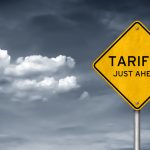In his fine Public Discourse essay “Free Trade as Prosperity, Free Trade as Human Right,” Samuel Gregg argues that relatively free trade among nations has at least two advantages. First, it tends to make all nations wealthier over time. This is because, as is generally acknowledged, larger markets encourage greater division of labor, which tends to increase the quantity and quality of goods and services and the efficiency with which they are produced. It also makes for more dynamic flexibility in allocation of resources and patterns of production (in Gregg’s words, it allows “individuals, businesses, and entire nations to find, develop, or even change their comparative advantage”). This elicits a high degree of productive creativity that redounds to the common good.
Second, and more provocatively, freedom to trade goods and services is a defeasible but still important human right. Gregg adduces two main arguments in support of this: Francisco de Vitoria’s argument that the right of peoples to trade is part of a more general right to freedom of association and Hugo Grotius’ argument that the universal destination of the earth’s goods (and, it would seem, services) requires international markets. Such markets are the only reliable means to “spread the wealth around” to all the peoples of the world. Viewed from this point of view, protecting free trade is (as Gregg quotes Edmund Burke as saying) a matter of justice, not merely utility.
Gregg’s article is full of compelling good sense; I wish to offer supplementary thoughts rather than a refutation.
The least controversial part of Gregg’s argument is the (broadly speaking) utilitarian one: free trade makes us all richer. After Adam Smith, this is intuitive and seems to be amply borne out by history. But one should also consider the risk of creating a dangerous interdependence. As modern society and economy have developed, there has been a striking decline in self-sufficiency at every level of social organization. Nations, regions, cities, towns, and neighborhoods depend, for the most part, far more critically on externally provided goods and services for basic functioning than they did two hundred years ago. If the British blockaded Manhattan today, they would win in half a week without firing a shot.
Start your day with Public Discourse
Sign up and get our daily essays sent straight to your inbox.This should be worrying for at least two reasons. The first is fairly straightforward: things can go suddenly and catastrophically wrong in any system, and the vaster, more complex, and more decentralized the system, the harder it is to control the damage. This is because it is harder to understand the chain of cause and effect and because it is harder for any authority to be effective in coordinating necessary remedial actions. It seems wise for communities of all sizes to insulate themselves partially from the effects of failures in larger markets, even at the price of gaining fewer benefits from participation in those markets. Maintaining such circumscribed but porous economies decreases but does not eliminate competition. Furthermore, it tends to nurture the local pride that can inspire good and creative work. We could therefore expect continuing innovation and growth in productivity within each economy, even if at a reduced rate. And such partial insulation is not merely self-interested, because, after all, one semiautonomous economic community can often provide assistance from a position of strength when another experiences internal failure. Loving your neighbor is rarely the same thing as chaining yourself to him.
The second reason hinges on a controversial judgment about the requirements for healthy polity. It is a judgment that may be risible or even unintelligible to those with very different political imaginations from mine, but it is important to propose it. Public authorities and legislators should promote integral human development. That is to say, development involving all the many, complex aspects of existence that make for a full human life. Deciding to seek integral human development does not lead automatically to any specific policies but (what is more radical still) changes the very language and patterns of reasoning followed in discussing policy options. If decision-makers chose to be explicitly responsive to all the various values in play when organizing the lives of their communities, political discourse would change almost beyond recognition.
Now, when it comes to making decisions about economics, a crucial value is generally overlooked: human beings are happiest when they belong to several concentric or overlapping communities, each with a distinctive way of life (enduring, usually, across many generations) and each enjoying a degree of organic wholeness; that is, the sense of being a demarcated ‘little world’ adequate (at least potentially) to provide the elements of a good, distinctly human life. Economies are deeply intertwined with concrete ways of life, and are crucial to establishing organic wholeness—they are not merely patterns of production to be judged only by their productivity and efficiency. Communities without somewhat circumscribed, partly independent economies of their own tend to have increasingly abstract and finally unreal existences.
Consider a household in which even mundane tasks are routinely “outsourced”—older siblings never babysit, parents never clean house or mow the lawn, no family members entertain each other on instruments or cook for each other. Although this household may be efficient and may greatly increase the Keynesian multiplier, making everyone richer, it is impoverished qua household. It will be diminished as a group of persons sharing a common good achieved in part by joint management of community resources. This is why there may be good reason to pay one’s own child to mow the lawn, even if someone else does it better and more cheaply.
There must obviously be due proportion in all things. Regions are not families, and still less are nations. The lesser degree of community will make economic relations within them less personal, less organic—and properly so. Still, even these levels of community may sometimes be given proportionate support by partly protecting their economies. Gregg points out that it is much harder to grow grapes in Scotland than in Italy. From this he concludes that it makes little economic sense for Scots to buy their own wine when they can buy Italian wine and redirect their energies. But let us say that that there were rewarding challenges and special, fascinating knowledge involved in making Scottish soil yield decent grapes; let us say that an admirable, humanly fulfilling way of life had grown up around this endeavor. An individual who esteemed the art of growing Scottish grapes and felt fondness for the famous grape-growing villages that dot the landscape, to one of which (let us say) all four of his grandparents belonged, and who thought of it as a great national institution that showed the rugged creativity of the Scottish people would not be stupid or wicked if he supported this comparatively disadvantaged industry by purchasing its produce at a higher price. If enough Scots felt this way, they might decide, after public deliberation, to collectively “pay more” for Scottish wine by subsidizing it. The ability to entertain seriously such contra-market choices is an important sign that an organic community has not devolved into a mere administrative department.
Look at the matter from a slightly different angle: Economic relationships, even when they include prices (as they often must), are most human when the law of supply and demand is not the only factor, when there is some degree of personal interest, knowledge, and concern between buyer and seller. The more open the economy, the less buyers and sellers are likely to know or care about each other in any given transaction. There will be more alienating bureaucracy and anonymity. Some such relationships seem unavoidable under modern conditions, and are, in any case, arguably worthwhile because of the benefits they provide. But surely economic life (which, lest we forget, is a large part of “Life” writ large) should not be dominated by such relationships. (It is worth noting in this connection that international trade is itself at its most comprehensively rewarding as a fully human activity when foreign goods are bought not merely because they are cheaper, but because they are associated with, and are the organic product, so to speak, of a locale and way of life that interests the buyer.)
Turning briefly to Gregg’s arguments that free trade is a right, I must agree with his points but suggest further considerations along the lines of what I have just been saying. Like de Vitoria, I think that free trade is part of free association, which is a real but defeasible right. Like Grotius, I think that international markets are vital in giving everyone a greater share in the world’s bounty. The question is, what are the full range of values that could, in theory, defeat (or at least limit) the prima facie right to free association, or defeat (or at least limit) the prima facie imperative to share the world’s bounty?
It is obvious to most people that limiting the freedom of association of prisoners is justifiable when public safety requires it. But, more interestingly, there is also general support for the limitations Amish communities place on their members’ freedom of association for the sake of communal integrity. Is it possible that a somewhat similar rationale could justify somewhat similar policies on the national level?
Because of the terrifying tendency of the modern state to abuse its coercive power, and because it is unhealthy and dangerous to compare nations too closely to religious communities, it is certainly hard to think of a case in which very strict state control of, say, travel or information would have any sane man’s support, whatever the reasons tendered for these restrictions. But creating another North Korea is not legislators’ only alternative to laissez-faire.
It may well be reasonable, for instance, to ban importation of certain foreign items, or of such items in certain quantities, or at least to put heavy duties on them, in order to prevent or limit the justly undesired social changes associated with them. After all, not everything for sale is worth having. It seems still more reasonable to use economic regulations to limit the social dislocation caused by the large movements of peoples associated with globalization. This can be done without coercion by measures such as impeding the free functioning of international labor markets through heavy duties on imported and exported labor.
My purpose here is not to support or oppose any nation’s international trade policies, and it is certainly not to propose any of my own. It is rather to insist that complex communal goods should never be ignored, even when other goods should obviously take precedence. It is crucial to do so, because by the very fact of attending to them we reinforce a properly nuanced conception of human flourishing—and therefore of the true nature of politics.
Samuel Gregg’s response to this article will appear on Friday.













